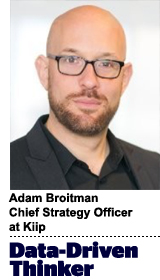 “Data-Driven Thinking” is written by members of the media community and contains fresh ideas on the digital revolution in media.
“Data-Driven Thinking” is written by members of the media community and contains fresh ideas on the digital revolution in media.
Today’s column is written by Adam Broitman, chief strategy officer at Kiip.
Despite the industry’s best efforts, the cost of ad fraud remains a $6.5 billion concern. Trust, in the world of digital advertising, is no stronger today than in years past. One might argue – and many do – that trust has grown weaker. As a result, a handful of companies today profit greatly by serving as arbiters of trust between ad buyers and sellers.
It’s not that these “trust brokers” – fraud monitoring and viewability vendors – don’t deserve their stature or success. They are necessary in an advertising ecosystem largely devoid of trust. But although these firms serve a critical function, most are not incentivized to guide the industry to long-term solutions.
As someone who has worked on both the buy and sell side of the media industry, I have been a party to the rise of the cottage industry that has grown around fraud prevention and viewability. But we’ve reached a concerning juncture. The ever-increasing lack of trust in the digital advertising world has made the demand for trust brokers so great that the pursuit of trust has become prohibitively expensive for many companies. At times, the costs even outweigh the benefits.
The overarching question the industry now faces is this: Can trust really be brokered by commercial entities whose incentive is to identify and track – but not necessarily eradicate – fraudulent, unviewable ads?
Brand marketers must lead the way
A handful of brand marketers are standing on the front lines of the ad fraud and viewability battlefield. Some even take to the stage at the IAB Annual Leadership Meeting each year and challenge the industry to do better.
Unfortunately, based on my experience, they are in the minority. Many brand marketers are content, or simply too busy, to take the lead on their own – much less the industry’s – ad trust efforts. In these situations, brand marketers hand the reins to their agencies. As an ex-agency executive, I can attest to the important role an agency plays in brand safety. But if the agent is the key driver in a brand’s safety efforts, the end result will not be optimal – at no fault of the agency.
Clients own the bottom line and the most direct relationship with their customers. Brand marketers have the most to lose when it comes to fraud. On the other hand, large agencies and holding companies often have favorable, ironclad agreements in place with fraud vendors. While great agencies serve as trustworthy brand stewards, the economics of brand marketers and the agencies that serve them are objectively divergent, even if they share similar day-to-day goals.
Some agencies refuse to work with publishers that don’t support their fraud vendor of choice, whether or not it is in the best interest of a given client. As a result, publishers must pay each fraud vendor’s fee if they want to work with all agencies. This dynamic is expensive, and it has caused the trust broker compound to grow tangled and bloated, leaving more room for dimly lit activity.
The next generation of trust
While it is not easy to eloquently capture all facets of the industry’s fraud issues in one column, it is apparent that we need a new generation of trust in the advertising industry. This new generation must be leaner and promote those that help to cure the disease, not merely bandage the wounds. This will require a fundamental shift in approach.
We need new approaches to reset the notion of value in modern media. For example, the Brave browser makes a bottom-up attempt to reduce ad fraud. The company, created by the inventor of JavaScript, addresses viewability and fraud by providing value to all parties in the digital media value chain. Brave blocks ads by default, but the browser also reimagines the value exchange in media through its cryptocurrency, the basic attention token. The token lets advertisers pay publishers, with the end user also receiving a cut in exchange for seeing ads.
By providing tools for advertisers, publishers and consumers, Brave attempts to distribute both cost and value across the media chain. This approach is one of the best models for value exchange on the market. It may not ultimately succeed, but by attempting to fix the underlying root causes of advertising fraud, it exemplifies the type of startups and outside-the-box thinking that are sorely needed.
In my opinion, advertising fraud will not be solved through the brokering of trust. It will be solved by a new guard of media vendors and systems with trust built in. The main difference between the old guard and the new? The new guard seems to be attempting to solve the problem for the long term.
Follow Kiip (@kiip) and AdExchanger (@adexchanger) on Twitter.
This post was syndicated from Ad Exchanger.


More Stories
McDonald’s, DDB tout ‘spiciest’ burger
TechMagic Podcast: The Promise and Caveats of AirChat
Trifecta for OMD at Cannes Young Lions 2024